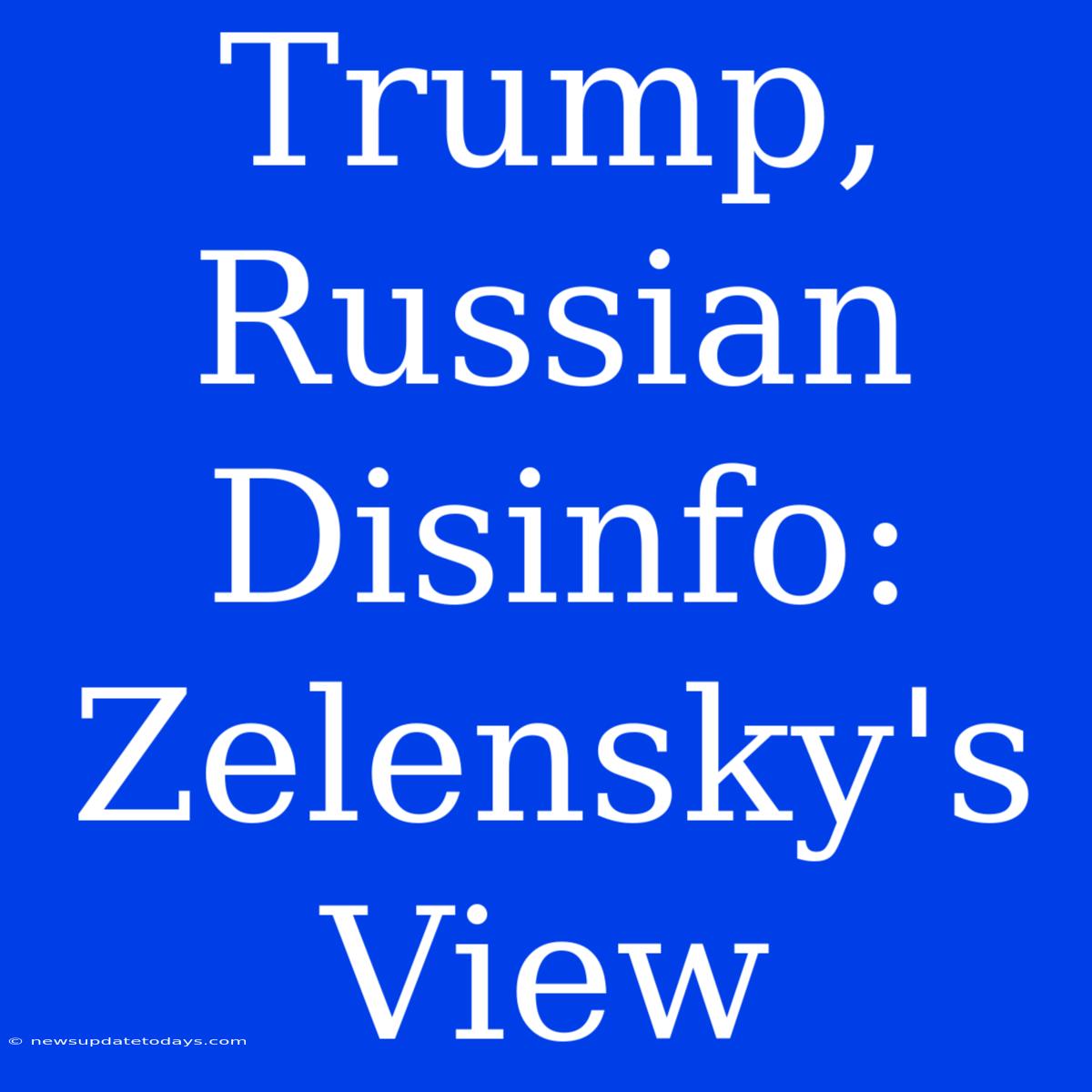Trump, Russian Disinformation, and Zelensky's Perspective: Unpacking the Complexities
The relationship between Donald Trump, Russian disinformation, and Volodymyr Zelenskyy's perspective forms a complex and highly debated issue. Understanding the intricacies requires examining the various narratives and evidence presented. This article delves into this multifaceted situation, offering insights and analysis based on available information.
Trump's Alleged Ties to Russian Disinformation
Allegations surrounding Donald Trump and Russian interference in the 2016 US presidential election have been persistent. These allegations include claims that the Trump campaign colluded with Russia to spread disinformation and undermine Hillary Clinton's candidacy. Special Counsel Robert Mueller's investigation, while not establishing a criminal conspiracy, documented numerous contacts between the Trump campaign and Russian individuals, raising concerns about potential compromising influence. Furthermore, critics point to Trump's often-positive rhetoric towards Vladimir Putin and his downplaying of Russian aggression as evidence of a troubling proximity to Russian interests.
Key Concerns:
- Social Media Manipulation: Claims of Russian-backed social media campaigns designed to sow discord and spread misinformation during the 2016 election remain a significant area of concern. These efforts aimed to influence public opinion and potentially affect the election outcome.
- Hacking and Leaks: The hacking of the Democratic National Committee (DNC) and the subsequent release of emails via WikiLeaks are widely attributed to Russian intelligence agencies. This action is seen as a direct attempt to interfere with the electoral process.
- Trump's Public Statements: Trump's public statements regarding Russia and its actions, often perceived as apologetic or dismissive, have fueled concerns about his susceptibility to Russian influence.
Zelenskyy's Perspective and Experiences
Volodymyr Zelenskyy, as President of Ukraine, has firsthand experience with Russian disinformation and aggression. Ukraine has been a target of sustained Russian disinformation campaigns aimed at undermining its sovereignty and destabilizing the country. Zelenskyy's perspective, therefore, offers a crucial counterpoint to narratives that might downplay or excuse Russian interference. He has consistently highlighted the threat posed by Russian disinformation, both domestically and internationally.
Zelenskyy's Key Observations:
- Direct Experience with Disinformation: Zelenskyy and his government have directly faced and countered numerous Russian disinformation efforts. These campaigns have included the spread of fabricated stories, the manipulation of information, and the use of propaganda to undermine his legitimacy and the Ukrainian government.
- Emphasis on International Cooperation: Zelenskyy has consistently stressed the importance of international cooperation in countering Russian disinformation. This includes efforts to expose and debunk false narratives, and working with international partners to defend against cyberattacks and propaganda campaigns.
- Contrast with Trump's Approach: Zelenskyy's perspective starkly contrasts with some of Trump's approaches to Russia. While Zelenskyy highlights the dangers of Russian aggression and disinformation, Trump's stances have often been perceived as more accommodating.
The Interplay and its Implications
The interplay between Trump's alleged ties to Russian disinformation and Zelenskyy's perspective creates a complex political landscape. Zelenskyy's experience provides a valuable lens through which to understand the real-world consequences of Russian interference. This perspective offers a stark counter-narrative to those who might minimize or dismiss the severity of the threat posed by Russian disinformation. Understanding this interplay is crucial for developing effective strategies to combat disinformation and protect democratic processes.
Further Research and Considerations:
- Investigate the specific instances of Russian disinformation targeting Ukraine and the US.
- Analyze the strategies employed by Russia to spread disinformation and influence public opinion.
- Evaluate the effectiveness of counter-disinformation efforts in both Ukraine and the US.
- Consider the long-term implications of Russian interference in democratic processes.
This article provides a starting point for understanding the complex relationship between Trump, Russian disinformation, and Zelenskyy's perspective. Further research and analysis are essential for a comprehensive understanding of this critical issue.

